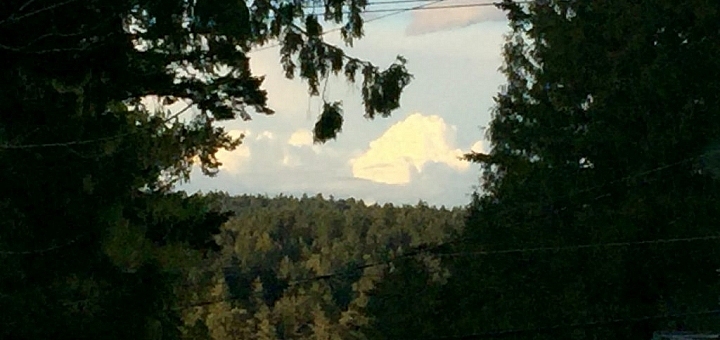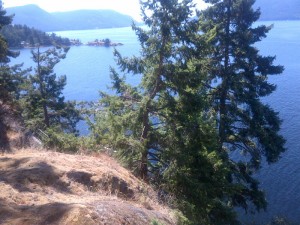(Salt Spring Islanders will hold a referendum September 9th on whether to incorporate as a municipality. With a year-round population of approximately 11,000, Salt Spring is the largest unincorporated community in British Columbia. Islanders have been down this road before, rejecting incorporation in 2002. And if passion is the most important determinant of election results, incorporation will surely go down to defeat again this time. The No side is passionate in its defence of the status quo; the Yes side — the side arguing for change –seems curiously detached. It may be that the Yes side made the classic campaign blunder: present the data, and the voters will surely be persuaded by the logic of our argument. But voters hardly ever vote with their heads, but with their hearts — especially when presented with a Yes or No, Choose-One-or-the-Other question about a proposition as multi-layered as the future of their home. For data can be manipulated: by the proponents, to paint a rosy picture of rainbows and unicorns…and by the opponents, to spin a horror story that will make your hair stand on end.
I sure as hell don’t want this idyllic isle we now call home to turn into yet another soulless clone of condo-choked oceanside resort towns the world over. Yet there’s no denying that this little piece of paradise faces some clear and present challenges, and some huge potential problems down the road. So I’ve written this rant as an open letter to both sides, and my overarching question is this: How are you going to guarantee that a victory by your side ISN’T going to ruin Salt Spring Island?)
Dear Yes and No Sides:
I know each of you thinks your opponent is lying — or, at least, each of you hopes to get me thinking that. At this late stage of the campaign, you’re both pretty much in the business of accusing each other of supporting a position that will mortally wound this island if it succeeds. So let me turn this around on you, and put this question to both of you:
How are you going to guarantee that a victory by your side isn’t going to ruin Salt Spring Island?
That’s an eminently fair question to ask. After all, each of you is engaged in trying to scare us into voting your way not by making a convincing argument about the good things that will happen if we do, but by warning of the bad things that will happen if we don’t.
As a relative newcomer to Salt Spring, there’s no way I understand every nuance of the years-long incorporation issue. But I think I have a pretty accurate impression.
The Yes side appears to be driven by local residents who are frustrated at the inordinate amount of time it takes to get anything done on Salt Spring. The system seems designed to ensure that decision-making moves at a glacial pace if it moves at all. It’s a great way to make sure bad ideas have a place to go to die. Unfortunately, it can be just as effective at slowly choking the life out of the good ideas.
The No side points to that very system and its deliberate uncoupling of land use planning and service delivery — the Islands Trust looks after land use planning, and the services are delivered by various other bodies — as the strategy that has protected Salt Spring’s farms and wild spaces from development. If a municipality finds itself short of revenue to pay for the services it delivers, it can rezone land for development that will generate more property tax dollars. So suburbs replace farmland, apartment towers replace houses, industry and shopping malls replace forests, and so on. The Islands Trust prevents this from happening here, at least somewhat.
Meanwhile, Salt Spring Island faces some critical issues. In reverse order, they are:
- The roads. Aging, improperly engineered to begin with, incapable of safely accommodating motor vehicles, bikes and pedestrians, reaching the end of their life cycle and prone to catastrophic failure. At least, that’s what I’m hearing from both sides and, apparently, a point of agreement. Yet the No side argues that a municipal government could not afford to fix the roads and so we should leave that job to the province — whose neglect of the roads got us into this mess.
- The water shortage. As the ranchers and farmers of Southern Alberta have been known to say, “Whisky’s for drinkin, water’s for fightin’.” And it seems this island fights a lot over water — who gets it, who doesn’t, and who should pay for it. The only consensus is that there isn’t enough of it. Well, there really is a shortage of water in semi-arid, drought-prone Southern Alberta, where the bulk of the available water comes from shallow prairie rivers that are fed by ever-shrinking glaciers. Here, we live in a temperate rain forest. It rains for five months of the year. We don’t have a water shortage. We have a water storage capacity shortage — a problem with a solution. Why haven’t we solved it yet?
- The housing crisis. I just did a quick check of MLS listings on Salt Spring (which may be out of date by the time you read this): 31 properties listed under $500,000. Of those, 21 were vacant lots. Too many renters live in substandard housing. Too many seasonal and service sector workers can’t find anyplace they can afford to rent. Plenty of well-meaning people and organizations are trying, but progress towards getting affordable housing built is painfully slow.
- The aging population. As I’m often reminded, “That’s most of us!” Salt Spring has become a hot spot to retire and if that’s a problem, I admit that I’m contributing to it. Of course, it’s not a problem, as long as there’s also an opportunity for younger people to establish themselves and raise their children here — the people who will grow our food, create jobs for other people, serve the tourists, and care for the aging and aged. Trouble is, that opportunity is hard to find when you can’t afford a place to live.
I know — it sounds as though I’m building a case for voting Yes. But every critical issue I’ve listed butts up against this final one:
- The need to preserve the wild spaces and protect the farms. The tiny, imperilled Coastal
Douglas Fir zone is one of the world’s rarest ecosystems and contains scores of rare species. As the directors of the Salt Spring Island Conservancy say in a letter to their members and supporters, “At a time when species extinction is rapidly increasing and many of the planet’s ecosystems are under stress, governments with a high commitment to conservation are crucial.” Seventy-five percent of the land on Salt Spring is privately owned. Most of this island hasn’t been in its wild, natural state for well on 150 years. But enough of it still is that preserving what’s left is vital. On much of the land that has been disturbed, food is grown. Locally. On family farms. By our neighbours. With care for the environment. It is a way of life that is under threat in most of rural North America and protecting it, too, is vital.
What’s my point? Simply this — that come the morning of September 10th, when the referendum votes have been counted and the sun comes up anyway, every one of these critical issues is still going to be facing us, regardless of which side wins. So, both of you, cut the crap and tell us how you’re not going to ruin the island if you win.
Yes side, stop blandly assuring us that there won’t be any development pressure because, “that’s all market-driven” — remember, we’re sandwiched between Vancouver and Victoria, two of the most overheated real estate markets on the planet. Give us specifics about how you’re going to control development pressure as a municipality and how you’re going to protect farmland and our farmers from being pushed out by urbanization.
No side, drop the line that, “once we incorporate, there’s no going back.” Salt Spring Island did incorporate in 1873 — and unincorporated ten years later. While you’re at it, give us specifics about how you propose to improve the current form of governance if we vote no. You began that process with a town hall on Monday at which you sketched out some options. But you don’t plan to put any meat on those bones until a followup event on September 26th. The referendum is on the 9th. You made this same argument about fixing the system in 2002 and we’re still waiting.
And while we’re on the topic of the system working or not, the Islands Trust didn’t preserve and protect Salt Spring against Texada’s logging on private land. It couldn’t, because it didn’t have the authority. That took good old Salt Spring Islander activism. So tell us, why wouldn’t activism work just as well in a municipal model?
The No side says, “Remember why you live here.” The Yes side says, “Yes empowers Salt Spring Island.” I say you both have work to do.









Leave a Reply